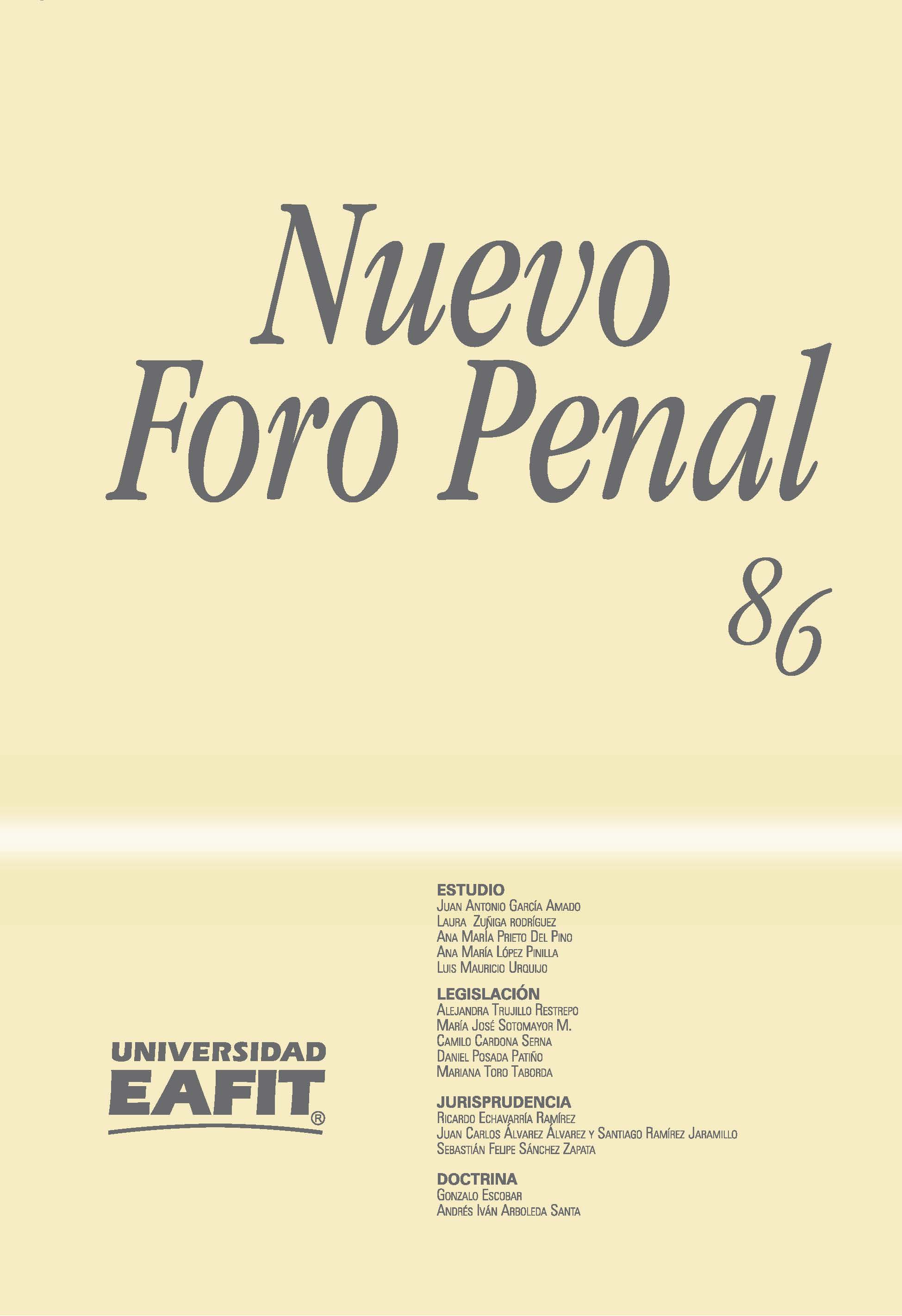¿Puede la tortura estar moralmente justificada en algún caso?
Main Article Content
Keywords
Tortura. Absolutismo moral. Consecuencialismo
Resumen
Con fundamento en la distinción entre juicios morales y jurídicos, el autor defiende la tesis de que la tortura, en ciertos casos, puede estar moralmente permitida. En consecuencia, se ubica en el bando de quienes se muestran contrarios a la posición de los absolutistas morales que no admiten en ningún caso y bajo ninguna consideración la posibilidad de la tortura. Por esto, en el texto se defiende que bajo situaciones particulares y desde una perspectiva moral, no es descartable que la tortura esté permitida. Ahora bien, ello ni puede significar una defensa a permitir jurídicamente la tortura, ni mucho menos avalar o no condenar ni mostrar el más absoluto rechazo a las torturas aplicadas en diferentes momentos por parte de diferentes gobiernos o cuerpos de seguridad.
Descargas
Referencias
ALLHOFF, FRITZ, “Torture Warrants, Self-Defense, and Necessity”, Public Affairs Quarterly, 25, 2011.
ALLHOFF, FRITZ, Terrorism, Ticking Time-Bombs and Torture. A Philosophical Analysis, Chicago, The University of Chicago Press, 2012.
AMBOS, KAI, Terrorismo, tortura y Derecho penal. Respuestas en situaciones de emergencia, Barcelona, Atelier, 2009.
ANSCOMBE, G.E.M., “Modern Moral Philosophy”, Philosophy, 33, nº 124, 1958.
BLACKBURN, PIERRE, La ética. Fundamentos y problemáticas contemporáneas, México, Fondo de Cultura Económica, trad. J.J. Utrilla Trejo, 2006.
BRECHER, BOB, Torture and the Ticking Bomb, Oxford, Blackwell, 2007.
BUFACCHI, VITTORIO, ARRIGO, JEAN MARIA, “Torture, Terrorism and the State: a Refutation of the Ticking Bomb Argument”, Journal of Applied Philosophy, 23, 2006.
CARD, CLAUDIA, “Thickinig Bombs and Interrogations”, Criminal Law and Philosophy, 2008.
DAVIS, MICHAEL, “The Moral Justifiability of Torture and other Cruel, Inhuman, or Degrading Treatment”, International Journal of Applied Philosophy, 19, 2005.
Exortación Apostólica Post-Sinodal Reconciliatio et Paenitentia, de Juan Pablo II, 1984, apartado 17.
FINNIS, JOHN, Absolutos morales, Barcelona, Ediciones Internacionales Universitarias, 1991, trad. de J.J. García Norro.
GRECO, LUIS, “Las reglas detrás de la excepción. Reflexiones respecto de la tortura en los grupos de casos de las ticking time bombs”, In Dret, abril de 2007.
GREER, STEVEN, “Is the Prohibition against Torture, Cruel, Inhuman and Degrading Treatment Really ´Absolute` in International Human Rights Law?”, Human Rights Law Review, 15, 2015.
GROSS, OREN, “The Prohibition on Torture and the Limits of Law”, en Torture. A Collection, Sanford Levinson, Oxford, Oxford University Press, 2004.
HILGENDORF, ERIC, “Folter im Rechtsstaat?”, Juristen Zeitung, 2004.
HOLMES, STEPHEN, “Is Defiance of Law a Proof of Success? Magical Thinking in the War on Terror”, en Karen J. Greenberg, The Torture Debate in America, Ney York, Cambridge University Press, 2005.
JÄGER, CHRISTIAN, “Das Verbot der Folter als Ausdruck der Würde des Staates”, en Strafrecht zwischen System und Telos. Festschrift für Rolf Dietrich Herzberg zum siebzigsten Geburtstag, Tübingen, Mohr Siebeck, 2008.
KAMM, FRANCES. M., Ethics for Enemies. Terror, Torture and War, New York, Oxford University Press, 2011.
LEVINSON, SANFORD, “Contemplating Torture. An Introduction”, en Torture. A Collection, Oxford University Press, 2004.
LLOBET ANGLÍ, MARIONA, “¿Es posible torturar en legítima defensa de terceros?”, InDret, 2010.
LUBAN, DAVID, “Liberalism, Torture, and the Thicking Bomb”, en The Torture Debate in America, Karen J. Greenberg, Ney York, Cambridge University Press, 2005.
LUBAN, DAVID, “Unthinking the Ticking Bomb”, en Global Basic Rights, Ch.R. Beitz, R. E. Goodin -eds.- Oxford University Press, 2011.
LUBAN, DAVID, “Unthinking the Ticking Bomb”, en: Ch.R. Beitz, R. E. Goodin -eds.- Globan Basic Rights, Oxford University Press, 2011.
MCDONALD, CATHERINE, “Deconstructing Ticking-Bomb Arguments”, Global Dialogue, 12, 2010.
MCMAHAN, JEFF, “Torture and Method in Moral Philosophy”, Torture, Law, and War, Scott Anderson and Martha Nussbaum, eds., Chicago, University of Chicago Press, 2016.
MENDUS, SUSAN, “Professor Waldron Goes to Washington”, Criminal Law & Philosophy, 8, 2014, p. 125.
MITSCH, WOLFGANG, “Verhinderung lebensrettender Folter”, en Strafrecht als Scientia Universalis. Festschrift für Claus Roxin zum 80. Geburtstag am 15. Mai 2011, Berlín, de Gruyter, 2011.
MOLINA FERNÁNDEZ, FERNANDO, “La ponderación de intereses en situaciones de necesidad extrema: ¿es justificable la tortura?”, en La respuesta del Derecho penal ante los nuevos retos, A. Cuerda Riezu -dir.-, Madrid, Dykinson, 2006.
PRITTWITZ, CORNELIUS, “Strafwürdigkeit und Strafbarkeit von Folter und Folterandrohung im Rechtsstaat”, en Strafrecht zwischen System und Telos. Festschrift für Rolf Dietrich Herzberg zum siebzigsten Geburtstag, Tübingen, Mohr Siebeck, 2008.
ROXIN, CLAUS, “El nuevo desarrollo de la dogmática jurídico-penal en Alemania”, InDret, octubre de 2012.
ROXIN, CLAUS, Culpabilidad y prevención en Derecho penal, Madrid, Reus, 1981, traducción de F. Muñoz Conde.
ROXIN, CLAUS,“Kann staatliche Folter in Ausnahmefällen zulässig oder wenigstens straflos sein?”, en Menschengerechtes Strafrecht. Festischrift für Albin Eser zum 70. Geburtstag, München, Beck, 2005
SHUE, HENRY, “Torture in Dreamland: Disposing of the Ticking Bomb”, Case Western Reserve Journal of International Law, 37, 2006.
SHUE, HENRY, “Torture”, en Torture. A Collection, Sanford Levinson (ed.), Oxford University Press, 2004.
STOUT, NATHAN, “Ticking Bombs and Moral Luck: An Analysis of Ticking Bomb Methodology”, Human Rights Review, 12, 2011.
SUSSMAN, DAVID, “What´s Wrong with Torture?”, Philosophy & Public Affairs, 33, 2005.
THOMSON, JUDITH JARVIS, “Killing, Letting Die, and the Trolley Problem”, en Ethical Theory. An Anthology, Russ Schafer-Landau (ed.), Blackwell, 2ª ed., 2013.
TINDALE, CHRISTOPHER W., “Tragic Choices: Reaffirming Absolutes in the Torture Debate”, International Journal of Applied Philosophy, 19, 2005.
WALDRON, JEREMY, “Responses to Zedner, Haque and Mendus”, Criminal Law & Philosophy, 8, 2014.
WALDRON, JEREMY, “What are moral absolutes like”, Harvard Review of Philosophy, 18, 2012
WALDRON, JEREMY, Torture, Terror and Trade-Off. Philosophy for the White House, Oxford, Oxford University Press, 2010.
WALZER, MICHAEL, “Dirty hands and ordinary life”, Philosophy and Public Affairs, 2, 1972.
WISNEWSKI, JEREMY. J., EMERICK, R.D., The Ethics of Torture, London/New York, Continuum, 2009.

